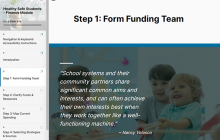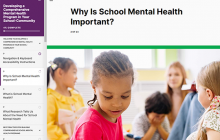Trauma is a common and costly public health issue with harmful effects on individuals, families and communities. Experiences of trauma may include physical, sexual, and emotional abuse; family and community violence; natural disasters; wars; and the ongoing, cumulative impact of poverty, racism, and oppression. Research shows that trauma does not discriminate and affects individuals and groups across all genders, ages, socioeconomic statuses, geographical locations, racial and ethnic identities, and sexual orientation. Trauma that is ongoing and that is experienced without adequate support—particularly from an early age—and can have a devastating, long-term impact on health and well-being.
A universal strategy for addressing trauma that ensures a shared understanding of trauma and its impact, and a collective response to align practices and policies to support resilience and healing across a program, organization, school, agency, or service delivery system.
There is a growing movement across service sectors and in education to prevent and address the effects trauma by taking a “trauma-informed” approach to how these systems operate in an effort to create conditions that promote safety, healing and growth.
In a trauma-informed program, organization, or system, all aspects of service delivery—from how services are provided to what procedures and policies are adopted—are designed to prevent, address, and lessen the effects of trauma on service recipients, providers, and organizations. Often this requires changes to the practices, policies, and culture of organizations and systems.
Who We Are
The Trauma-Informed Care team at AIR takes a comprehensive, collaborative, and reflective approach in our work with agencies, organizations and systems across service sectors and of all sizes.
- Comprehensive: Our expertise spans a wide range of systems—from schools and justice settings to human service organizations and government entities.; We support you in taking a close look at every layer of your organizational policies and practices.
- Collaborative: We work with the distinct mission, vision, and needs of your system to identify unique and meaningful ways to apply trauma-informed principles. We assist your system in translating the abstract principles of trauma-informed care into concrete, actionable steps.
- Reflective: We support your system in reflecting on strengths as well as potential areas for growth.; We assist you in asking key, transformative questions as you consider ways to integrate trauma-informed principles into your organizational culture.
Our team works closely with subject matter experts and professionals across AIR’s diverse service areas and we are able to further bolster our work by tapping into AIR’s more than 70 years of experience and leadership in the social and behavioral sciences.
What We Do
Learn more about our training and technical assistance and resource development capabilities.
We support systems in creating and bolstering trauma-informed environments, practices, policies, and programs that transform, uplift and empower administrators, staff, and service recipients. AIR offers a range of trauma-informed services designed to transform systems and increase capacity to provide trauma-informed care. We do this in a variety of ways, including:
- Assisting health and human service and educational agencies and systems in assessing their current capacity to provide quality care for trauma survivors.
- Providing training and coaching to enhance the capacity of health and human service and educational sectors to address and mitigate the negative effects of trauma on children, youth, and adults.
- Working to eliminate practices, policies, and structures that perpetuate trauma across systems.
- Contributing to efforts to build healthy, resilient communities.
View our full-page infographic, Trauma: A Public Health Issue (PDF).









